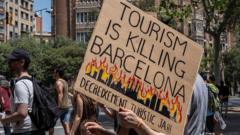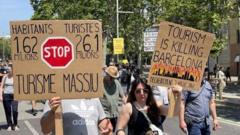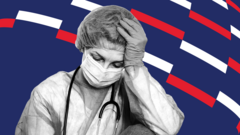Amid an ongoing healthcare crisis, the mayor of Belcastro, a small village in Calabria, humorously decrees a ban on serious illness to draw attention to the lack of medical facilities and services. With an ageing population and long distances to emergency care, local residents live under precarious health conditions, showcasing the urgent need for systemic change.
Italian Village Proclaims Ban on Illness to Highlight Healthcare Crisis

Italian Village Proclaims Ban on Illness to Highlight Healthcare Crisis
In a satirical move, Belcastro's mayor aims to spotlight serious healthcare deficiencies in the southern Italian region of Calabria.
In a unique and somewhat tongue-in-cheek initiative, the mayor of Belcastro, a quaint village in southern Italy, has issued a decree forbidding residents from falling ill. This unusual measure aims to draw attention to the serious deficiencies in the healthcare system affecting the area, nestled in the impoverished region of Calabria, which suffers from a lack of medical services and resources.
According to local Mayor Antonio Torchia, the directive requests residents to "avoid contracting any illness that may require emergency medical assistance." The village, home to approximately 1,200 residents—many of whom are elderly—faces significant challenges in accessing healthcare. The nearest Accident & Emergency (A&E) department is situated over 45 kilometers (approximately 28 miles) away, requiring a journey on roads that have a speed limit of just 30 km/h (18 mph).
In remarks to Italian television, Torchia explained that this humorous decree was intended as a provocative comment on the dire healthcare situation in Belcastro, emphasizing that traditional alerts and requests to local authorities have often gone unnoticed. The village's local healthcare facility operates irregular hours and is sometimes entirely closed during weekends, holidays, or after hours, leaving residents feeling vulnerable and unsafe.
The mayor's decree also includes advisories for the residents to minimize potentially harmful activities, urging them to avoid departures from their homes, travel, sporting activities, and instead focus on resting. The feasibility of enforcing such regulations remains unclear, raising questions about the intersection of humor and public policy amid serious health concerns.
Calabria has experienced a rapid decline in healthcare services, with eighteen hospitals closing since 2009 and many residents seeking medical attention outside the region due to inadequate local facilities. With a central government-appointed administration struggling under the weight of significant hospital debt, the regional healthcare crisis continues, leaving many feeling neglected by the system.
Support for Mayor Torchia's initiative appears to resonate among locals, with residents expressing appreciation for his spotlight on healthcare issues. The mayor’s provocative decree has sparked discussions about the dire state of healthcare in Calabria, bringing urgent attention to an issue that has plagued the region for years.


















